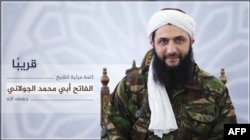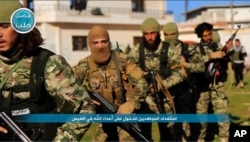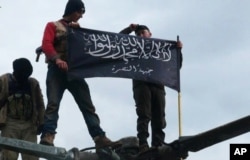Showing his face for the first time since his jihadist group was formed in 2012, the head of Syria's Jabhat al-Nusra, Abu Mohamad al-Jolani, announced that he was breaking ties with al-Qaida in remarks broadcast Thursday by Al-Jazeera news channel.
Just hours after al-Qaida leader Ayman al-Zawahiri gave his blessing for the severing of formal ties, al-Jolani said Jabhat al-Nusra would change its name to Jabhat Fateh al-Sham. He expressed gratitude to the "commanders of al-Qaida for having understood the need to break ties."
The intervention by Osama bin Laden's successor in an internal strategic debate among al-Nusra leaders that has waxed and waned for more than two years comes as the Assad regime offered unarmed rebels in besieged parts of Aleppo an escape route.
Syria's president, Bashar al-Assad, also offered amnesty to rebels who lay down their arms and surrender within three months.
Both developments have the potential to alter the dynamics of the complex six-year Syrian civil war by triggering a realignment of rebel groups, according to analysts.
The regime offer of safe passage from Aleppo for insurgents is likely to spark a vigorous wrangling among rebel factions, some of whom have long felt that the armed rebellion had become too bogged down defending rebel-held districts in Syria's onetime commercial capital.
Hope for aid propels move
The consequences of al-Nusra renouncing its ties to al-Qaida, something the affiliate's leaders have debated since August 2014, offers the group hope of receiving substantial aid from Gulf states. But analysts warn the split would be cosmetic only and is part of a longer-term game.
In May 2015, al-Nusra came close to severing formal ties with al-Qaida after the 7,000-member group dominated by Syrian fighters came under strong behind-the-scenes pressure from Gulf states to do so, with the promise that arms and supplies would be forthcoming, according to rebel commanders at the time. Islamist militias such as Aurar al-Sham, which has been in alliance with al-Nusra, also urged the rebranding.
In an audio message released Thursday, al-Zawahiri indicated he would not oppose the split.
"The brotherhood of Islam that bonds us is stronger than any obsolete links between organizations," he said, "These organizational links must be sacrificed without hesitation, if they threaten your unity."
This is the second time al-Qaida's al-Zawahiri has indicated he wouldn't oppose a split. But this announcement is much clearer, and made more so by support from al-Zawahiri deputy, Abu al-Khayr al-Masri, who also released a message Thursday.
He says al-Qaida would have no problem with "any possible action" al-Nusra's leaders take to boost unity among anti-Assad rebel factions and form a "new generation" of fighters.
Al-Qaida's affiliate in Syria has managed to build a large base of support among insurgents in the war-torn country, and has had some success in persuading regional governments it should be seen as a useful partner in the conflict raging in Syria, by marketing itself as the moderate alternative to Islamic State extremists.
By restraining its fighters from enforcing as strict a Sharia law code as Islamic State and by developing ties with Islamist rebel militias, Jabhat al-Nusra had increasingly embedded itself in insurgent-held areas.
Split seen as deceptive ploy
But U.S. defense and intelligence officials are skeptical Thursday's announcement is anything more than a public relations gambit.
"At the core of it, they are still al-Qaida," U.S. Central Command Commander Gen. Joseph Votel told a security forum in Aspen, Colorado.
"It's a PR move," U.S. National Intelligence Director James Clapper said, speaking at the same forum. "Whether or not they actually are separating from al-Qaida, I think that remains to be seen."
Clapper added there could be another reason Jabhat al-Nusra would want to reposition itself and galvanize other opposition groups: self-preservation.
"They are concerned about being singled out as a target, particularly by the Russians," he said.
Charles Lister, author of the book “The Syrian Jihad,” agrees any split with al-Qaida would be cosmetic only, part of a deceptive "long game" jihadist strategists are playing to ensure the survivability of al-Nusra in Syria and to spread its influence.
In a paper written for the Brookings Institution, Lister argues al-Qaida has adopted a strategy of gradualism.
"By establishing a durable presence in Syria and potentially considering separating itself from al-Qaida internationally, Jabhat al-Nusra seeks to realize its long-term vision of establishing Islamic Emirates inside Syria, as components of a future caliphate," Lister argues in the study, "Profiling Jabhat al-Nusra."
An analyst with the Foundation for the Defense of Democracies, Daveed Gartenstein-Ross, says "al-Qaida is stealthier than the Islamic State."
"Far from demonstrating al-Qaida's declining influence, this heralds its return to the organization's pre-2014 strategy. Prior to IS's rise, al-Qaida made heavy use of front groups and non-AQ brands to confuse its enemies, better appeal to local populations, and reduce its exposure to counterinsurgent forces," he told VOA.
"The fact that al-Qaida is making such a move shows that it is much less concerned about IS gobbling up its affiliate organizations than is generally believed," he added.
A formal split risks adding to strains between Gulf states and the United States over strategy in Syria. U.S. officials tell VOA they will remain highly skeptical of al-Nusra's intentions and motives, following the announcement of the severing of ties with al-Qaida.
National Security Correspondent Jeff Seldin contributed to this report.







